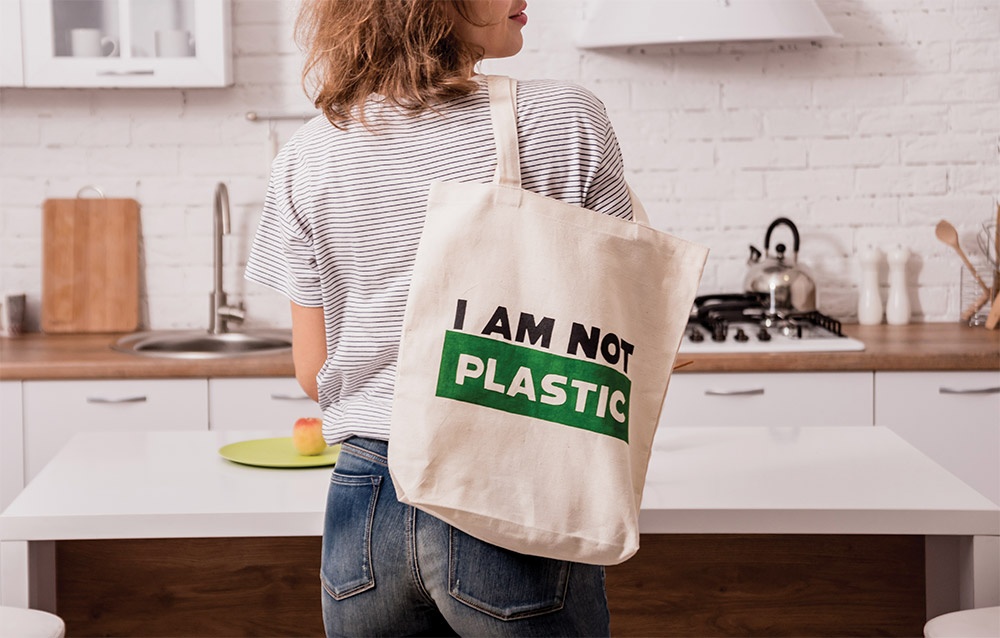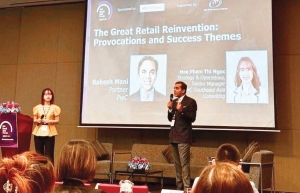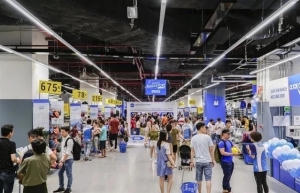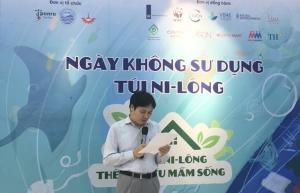Retailers advocate for green habits
Retail businesses in Vietnam need practical measures to promote green consumption, as emphasised at the No Plastic Bag Campaign focusing on reducing plastic bag usage launched last week by the Institute of Strategy and Policy on Natural Resources and Environment (ISPONRE) and the Alliance of Retailers to Reduce Plastic Bags.
The campaign has been rolled out in supermarkets and shopping centres that are members of the Alliance, such as Central Retail Vietnam, AEON Vietnam, and TH true MART since June 29.
Central Retail is implementing a comprehensive approach to encourage changes in consumer behaviour and limit plastic packaging from suppliers. Chalermchai Pornsiripiyakool, its vice president of international relations and social responsibility in Vietnam, acknowledged difficulties in persuading customers to alter their habits.
“In Vietnamese households, plastic bags serve as both shopping bags and rubbish bags. For this reason, when we began, customers sometimes became dissatisfied if the retailer didn’t offer them a plastic bag,” said Pornsiripiyakool.
 |
| Retailers advocate for green habits, illustration photo/ Source: Shutterstock |
To change customer behaviour, Central Retail promoted the No Plastic Day Campaign on July 3, encouraging the use of personal shopping bags, reusable eco-friendly bags, and free cardboard boxes for goods. In Central Retail Vietnam’s supermarkets, environmentally friendly bags are sold without profit.
“We’ve already done programmes like this for a few years, and we continue it this year. We believe that when customers go shopping in our supermarkets, the benefits enhance our business growth and give back to the community,” said Pornsiripiyakool.
From the sourcing phase, Central Retail Vietnam actively negotiates with suppliers to change packaging methods, replacing plastic components with eco-friendly biological materials. This plastic waste reduction initiative is a strategic step towards Central Retail’s goal of becoming a green, sustainable retail group.
Another major retailer, AEON Vietnam, has been implementing projects to promote green consumption by reducing single-use plastic waste. The No Plastic Bag Campaign is part of the environmental sustainability pillar in AEON Vietnam’s sustainable development strategy. The project aims to reduce the amount of disposable plastic bags and products across AEON Vietnam’s entire business system, encouraging customers to adopt sustainable consumption habits.
Following this project’s implementation, the number of transactions refusing single-use plastic bags has gradually increased, from 3 per cent in 2020 to 6 per cent in 2023. The total number of single-use plastic bags reduced over four years is over 12 million bags, equivalent to 133 tonnes, with over six million bags reduced in 2023 alone.
This year, AEON Vietnam has expanded the activities in the No Plastic Bag Campaign with initiatives such allowing customers to rent eco-friendly bags directly at checkout counters, and the Greenline initiative with priority checkout counters for customers who do not use plastic bags or use environmental friendly products in the self-service food area.
TH Group, the first dairy company in Vietnam to use bio-based bags, continues to expand its sustainable consumption initiative at TH true MART stores. Some 20 TH true MART stores in Hanoi and Ho Chi Minh City have been participating in the scheme to collect used paper cartons since February, towards the end of the year.
The programme collects used paper cartons from consumers, with TH Group contributing VND100,000 ($4) per 1kg of collected cartons to the Coral Reef Monitoring and Conservation Project at Cat Ba National Park in Haiphong. TH Group plans to allocate approximately $11,800 to this project in 2024.
Green consumption is also considered a crucial move for e-commerce. According to Mike Zhang, Head of Vietnam Business at Alibaba, the company saw an 88 per cent global increase in keywords such as sustainable, eco-friendly, biodegradable, and similar over the past year.
As reported by the Vietnam E-commerce Association and World Wildlife Fund in 2023, in Vietnam, online retail used 1.84 billion packaging units, with plastic packaging and materials amounting to 306,000 tonnes.
Growing at over 25 per cent annually, e-commerce plastic waste is projected to reach 800,000 tonnes by 2030. Plastic bags are used across all online platforms, including websites, e-commerce marketplaces, and social media. Notably, 90 per cent of sellers in fashion, accessories, and fast food sectors use plastic packaging.
In Vietnam in April, TikTok Shop partnered with National Assembly Television to launch the #HiGreen initiative, promoting green, sustainable, and environmentally friendly products. Green consumer products will be labelled #HiGreen, displayed in the #HiGreen tag on the shop tab, and feature in weekly sales.
Additionally, leveraging its short-video platform, TikTok Shop encourages content creators to experience and tour production facilities, boosting videos that support communication, product promotion, and direct livestream sales for sustainable consumer products.
To reduce packaging and shipping waste, Lazada introduced initiatives in 2023, including paper recycling, smart technology application, and plastic material reduction. For sellers, Lazada published a guide on efficient, environmentally friendly packaging to help save materials, minimise risks, improve business efficiency, and reduce environmental waste.
According to a survey by Intage Vietnam Market Research Company in 2023, sustainable development positively influences customer goodwill towards businesses. Of consumers in Hanoi and Ho Chi Minh City, nearly 90 per cent support ethical and socially responsible businesses, while 43 per cent have a positive impression of environmentally friendly brands and companies.
In response to the increasing trend towards green consumption, the Alliance of Retailers to Reduce Plastic Bags was established in 2021 by the ISPONRE. It comprises 16 retailers in Vietnam and aims to help reduce disposable plastic bag use in retail stores, supporting sustainable production and consumption goals.
By year-end, Hanoi aims for all supermarkets and shopping centres to eliminate non-biodegradable plastic bags and transition to eco-friendly packaging.
To achieve this goal, Hanoi has tasked the Department of Industry and Trade with leading efforts to enhance communication on sustainable production and consumption, and promoting the distribution of environmentally friendly products in supermarkets and shopping centres.
| Nguyen Bang Lang, manager, Corporate Sustainability & External Relations AEON Vietnam
The first task to mention is to help create the habit of refusing plastic bags among customers and employees. According to the customer survey conducted by AEON Vietnam, forgetting to bring their own reusable bags when shopping is one of the top two reasons why customers still choose to use single-use plastic bags. We launched an initiative to lend environmentally friendly bags in 2022. Firstly, we must facilitate the habit of refusing plastic bags for customers and employees. We also launched an initiative for customers to rent an eco-bag when they come to AEON. For example, instead of spending VND20,000 (86 US cents) to buy a new eco-friendly bag, customers can deposit VND5,000 (21 US cents) to rent one bag, use it, and return it to us the next time so that they can receive their deposit back. In the early years when we first launched the Plastic Community Free campaign, the rate of customers refusing to use plastic bags when shopping at supermarkets was only 0.1 per cent, but now, in 2024, this rate has reached 7 per cent. All stores of AEON Vietnam are following the strategy of reducing, reusing, and recycling. Regarding savings, we have optimised the selling process so that in each transaction the amount of plastic bags is optimised. For example, in the past it was five bags on average, but now it is reduced to three bags. In addition to the story of plastic bags, of course, other items are also crucial. For example, replacing lighting fixtures with LED fixtures can save energy, and therefore we also have awards for effective energy-saving buildings. Nguyen Trung Thang, deputy director, Institute of Strategy and Policy on Natural Resources and Environment
Single-use plastic and nylon bags, although convenient, are causing significant harm to the environment and having a negative impact on the economy. According to the Ministry of Natural Resources and Environment, Vietnam generates approximately 1.8 million tonnes of plastic waste each year, including over 30 billion nylon bags. On average, each household uses around 1kg of nylon bags per month, with over 80 per cent of it discarded after a single use and only a small portion being properly processed. Along with other countries, Vietnam has committed to taking strong actions to minimise plastic waste and nylon bags. The 2020 Law on Environmental Protection clearly stipulates the responsibilities of producers in recycling and waste management, as well as regulations on plastic waste reduction, reuse, recycling, and the prevention of plastic waste pollution in the ocean. To minimise the use of plastic bags and single-use plastic products, the alliance of retailers to reduce plastic bags was established in 2021 with the participation of 16 retailers. The formation of this alliance is part of a project implemented by us in collaboration with the Hanoi Department of Industry and Trade Expertise France. The project aims to organise various communication activities to raise awareness about reducing the use of single-use plastic bags and implement solutions to reduce plastic waste in shopping and consumption. The alliance has implemented various communication activities to help retailers change consumer awareness towards sustainability. Our goal is to use 100 per cent environmentally friendly plastic bags and packaging in shopping centres and supermarkets by 2025, replacing non-biodegradable plastic bags for household purposes. |
 | Business model reinvention a priority for all retailers There are challenges, opportunities, and transformation priorities in Vietnam’s retail sector. |
 | Vietnam’s retail market takes on much-needed green journey To pull in Millennials and Gen-Z generations of consumers, developers are not only adding new restaurants and retailers but also placing more emphasis on sustainability. |
 | Int'l retailers seek qualified Vietnamese suppliers Large international retailers including Aeon, Uniqlo, Walmart, Amazon, Safeway, Carrefour, Decathlon, Central Group and Ikea have been visiting Vietnam seeking partnerships in industrial, agricultural and handicrafts products, said industry insiders and officials. |
 | Leading retailers join forces to reduce plastic bag usage Vietnam retailers unite in the No Plastic Bag Campaign, promoting changes in consumers' plastic bag consumption habits. |
What the stars mean:
★ Poor ★ ★ Promising ★★★ Good ★★★★ Very good ★★★★★ Exceptional
Related Contents
Latest News
More News
- PM outlines new tasks for healthcare sector (February 25, 2026 | 16:00)
- Ho Chi Minh City launches plan for innovation and digital transformation (February 25, 2026 | 09:00)
- Vietnam sets ambitious dairy growth targets (February 24, 2026 | 18:00)
- Masan Consumer names new deputy CEO to drive foods and beverages growth (February 23, 2026 | 20:52)
- Myriad risks ahead, but ones Vietnam can confront (February 20, 2026 | 15:02)
- Vietnam making the leap into AI and semiconductors (February 20, 2026 | 09:37)
- Funding must be activated for semiconductor success (February 20, 2026 | 09:20)
- Resilience as new benchmark for smarter infrastructure (February 19, 2026 | 20:35)
- A golden time to shine within ASEAN (February 19, 2026 | 20:22)
- Vietnam’s pivotal year for advancing sustainability (February 19, 2026 | 08:44)



 Tag:
Tag:




















 Mobile Version
Mobile Version